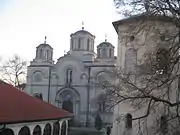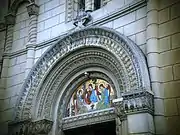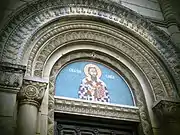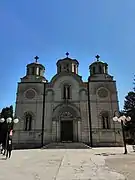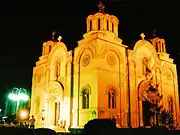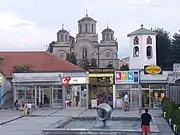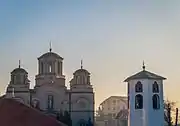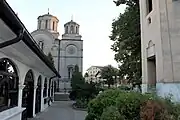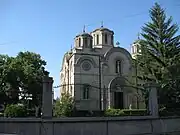Cathedral of the Holy Trinity, Leskovac
The Cathedral of the Holy Trinity (Serbian Cyrillic: Саборна црква Свете Тројице) is a cathedral of Diocese of Niš, located in the center of Leskovac. It is one of the most important segments of the architectural heritage of Leskovac, today it is under state protection as a cultural monument.[1]
| Cathedral of the Holy Trinity | |
|---|---|
Саборна црква Свете Тројице | |
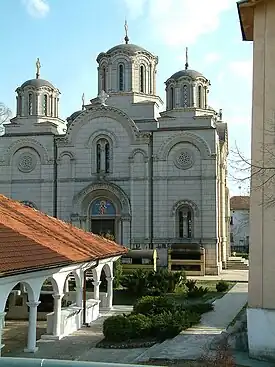 | |
| Denomination | Serbian Orthodox |
| Architecture | |
| Architectural type | Serbo-Byzantine architecture Moravian Rascian |
The initiative to build the brothel was launched on Vidovdan in 1919. The construction work, according to Andos' plans, began in September 1922, the foundation was consecrated on October 15, 1922. The temple was completed in 1931 and its solemn consecration was attended by King Alexander I Karadjordjevic of Serbia and all Yugoslavia.[2]
History
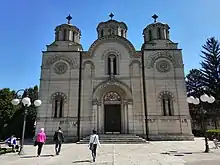
The Church of the Holy Trinity was built next to the city's old Church of the Nativity of the Mother of God on the initiative by Stojan Nikolić, the president of the municipality of Leskovac. Professor Sreten Ilić began to raise funds for the erection of the building, but was interrupted because of the World War I.
After the war, in 1919, the idea was taken up with a new fundraising campaign; the king Alexander and Queen Marie are among the donors. In 1922, construction of the church began, according to a project by architect Vassily Androsov. In 1928, the interior of the building was decorated with frescoes by artist, Andrei Bitsenko.[3]
In 1931, the church was consecrated by Patriarch Barnabas and by the bishop of the eparchy of Niš Dositej Vasić.[3]
Architectural characteristics
The base of the temple is approximately square in shape, designed according to the system of a developed isosceles inscribed cross with five domes. The central solution, with a dominant slender dome over the central part of the nave and four smaller ones at the corners, is especially pronounced in the external appearance of the temple. The temple is characterized by rich portal decoration and biforas under arched gables. The principle of respecting strict symmetry, implemented in the external composition, was also applied to its interior.
Although it is often described as a copy of the church of the Gracanica monastery, the common denominator with this magnificent Milutin's endowment is only in the application of the five-domed system and the dominant role of the main dome.
Church, characterized as a combination in Serbian-Byzantine style of Moravian and Rascian richly decorative and ornateness, The same symmetry applies to the exterior and interior of to the Serbian Orthodox Gračanica Monastery in the South province of Kosovo and Metohija, Serbia. Its thus dominated by five domes, one more slender in the center and four other smaller ones in the corners of the building,[2] the portal is richly decorated, elevated with five domes and the least present Raska elements, in portal shape.[2]
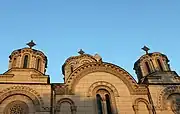 Top of the facade and detail of the domes of the Church of the Holy Trinity in Leskovac
Top of the facade and detail of the domes of the Church of the Holy Trinity in Leskovac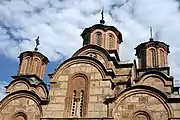 Top of the facade and detail of the domes of the Gračanica monastery church (14th century)
Top of the facade and detail of the domes of the Gračanica monastery church (14th century)
Images
References
- "СК 874: Саборна црква Св. Тројице, Лесковац". heritage.gov.rs. Retrieved 19 July 2018.
- "Православна Епархија нишка: Саборни храм Свете Тројице у Лесковцу". eparhijaniska.rs. Retrieved 19 July 2018.
- "Saborni hram". eparhijaniska.rs (in Serbian). Site de l'éparchie de Niš. Retrieved 18 April 2016.
Literature
- Кадијевић, Александар; Марковић, Срђан (1996). Градитељство Лесковца и околине између два светска рата. Лесковац: Народни музеј Лесковац. p. 31.
